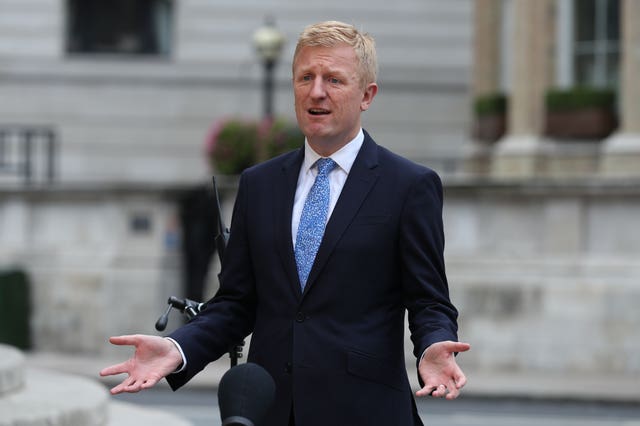
Clare Foges 6pm - 9pm
12 May 2021, 06:44

The draft Online Safety Bill will require social media and other platforms to clamp down on abuse or face tough penalties.
Ofcom will have the power to fine social media firms and block access to sites under new “landmark” internet laws aimed at tackling abusive and harmful content online.
The Government published the draft Online Safety Bill, which it says will help keep children safe online and combat racism and other abuse.
The Bill will require social media and other platforms to remove and limit harmful content, with large fines for failing to protect users.
The Government has also included a deferred power making senior managers at firms criminally liable for failing to follow a new duty of care, which could be introduced at a later date, while provisions to tackle online scams and protect freedom of expression have also been included.
As the #QueensSpeech outlined today, we'll be delivering new laws to protect the public, back our police and cut crime:
🇬🇧 The Borders Bill.⚖️ The Police, Crime, Sentencing and Courts Bill.🧒 The Online Safety Bill. https://t.co/49zzAEvC5D pic.twitter.com/OlHS2Hz6sF
— Priti Patel (@pritipatel) May 11, 2021
Pressure to more strictly regulate internet companies has grown in recent years amid increasing incidents of online abuse. A wide range of professional sports, athletes and organisations recently took part in a social media boycott in protest at alleged inaction by tech firms against online abuse.
As the new online regulator, Ofcom will be given the power to fine companies who fail to comply up to £18 million or 10% of their annual global turnover, whichever is higher – a figure which could run into billions of pounds for larger companies.
Ofcom will also have the power to block access to sites, the Government said.

The new rules, which are expected to be brought before Parliament in the coming months, are set to be the first major set of regulations for the internet anywhere in the world.
“Today the UK shows global leadership with our ground-breaking laws to usher in a new age of accountability for tech and bring fairness and accountability to the online world,” Digital Secretary Oliver Dowden said.
Writing in the Daily Telegraph, he added: “What does all of that mean in the real world? It means a 13-year-old will no longer be able to access pornographic images on Twitter. YouTube will be banned from recommending videos promoting terrorist ideologies.
“Criminal anti-semitic posts will need to be removed without delay, while platforms will have to stop the intolerable level of abuse that many women face in almost every single online setting.
“And, of course, this legislation will make sure the internet is not a safe space for horrors such as child sexual abuse or terrorism.”
As part of the new duty of care rules, the largest tech companies and platforms will not only be expected to take action against the most dangerous content, but also take action against content that is lawful but still harmful, such as that linked to suicide and self-harm and misinformation.
The Government said the deferred power to pursue criminal action against named senior managers would be introduced if tech companies fail to live up to their new responsibilities, with a review of the new rules set to take place two years after it is introduced.
The proposed laws will also target online scams, requiring online firms to take responsibility for fraudulent user-generated content, including financial fraud schemes such as romance scams or fake investment opportunities where people are tricked into sending money to fake identities or companies.
And there are further provisions to protect what the Government calls democratic content, which will forbid platforms from discriminating against particular political viewpoints, and allow certain types of content which would otherwise be banned if it is defined as “democratically important”.
“This new legislation will force tech companies to report online child abuse on their platforms, giving our law enforcement agencies the evidence they need to bring these offenders to justice,” Home Secretary Priti Patel said.
“Ruthless criminals who defraud millions of people and sick individuals who exploit the most vulnerable in our society cannot be allowed to operate unimpeded, and we are unapologetic in going after them.
“It’s time for tech companies to be held to account and to protect the British people from harm. If they fail to do so, they will face penalties.”
However, the NSPCC has warned that the draft Bill fails to offer the comprehensive protection that children should receive on social media.

The children’s charity said it believes the Bill fails to place responsibility on tech firms to address the cross-platform nature of abuse and is being undermined by not holding senior managers accountable immediately.
Sir Peter Wanless, chief executive of the NSPCC, said: “Government has the opportunity to deliver a transformative Online Safety Bill if they choose to make it work for children and families, not just what’s palatable to tech firms.
“The ambition to achieve safety by design is the right one. But this landmark piece of legislation risks falling short if Oliver Dowden does not tackle the complexities of online abuse and fails to learn the lessons from other regulated sectors.
“Successful regulation requires the powers and tools necessary to achieve the rhetoric.
“Unless Government stands firm on their promise to put child safety front and centre of the Bill, children will continue to be exposed to harm and sexual abuse in their everyday lives which could have been avoided.”
Labour called the proposals “watered down and incomplete” and said the new rules did “very little” to ensure children are safe online.
Shadow culture secretary Jo Stevens said: “There is little to incentivise companies to prevent their platforms from being used for harmful practices.
“The Bill, which will have taken the Government more than five years from its first promise to act to be published, is a wasted opportunity to put into place future proofed legislation to provide an effective and all-encompassing regulatory framework to keep people safe online.”